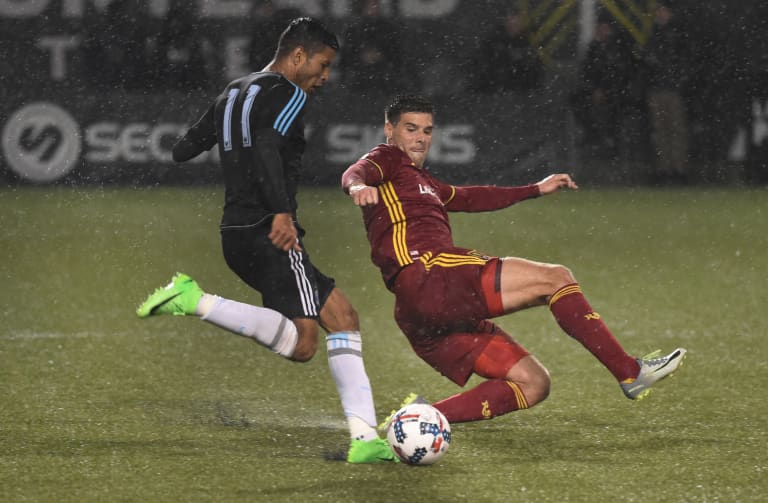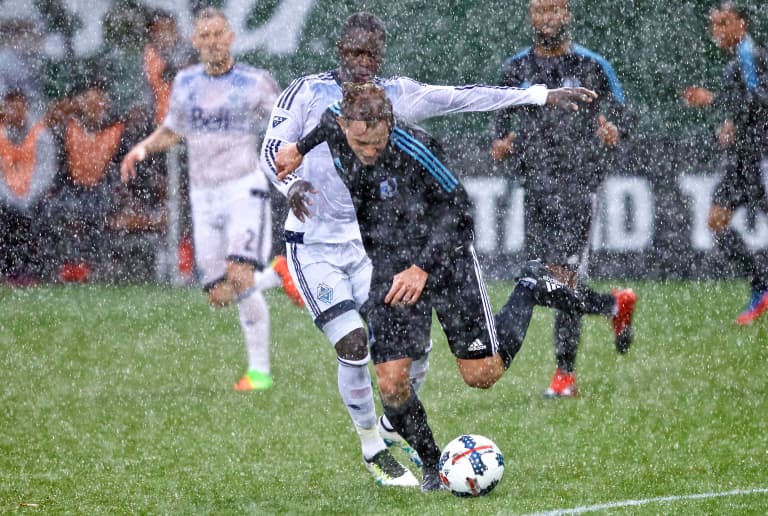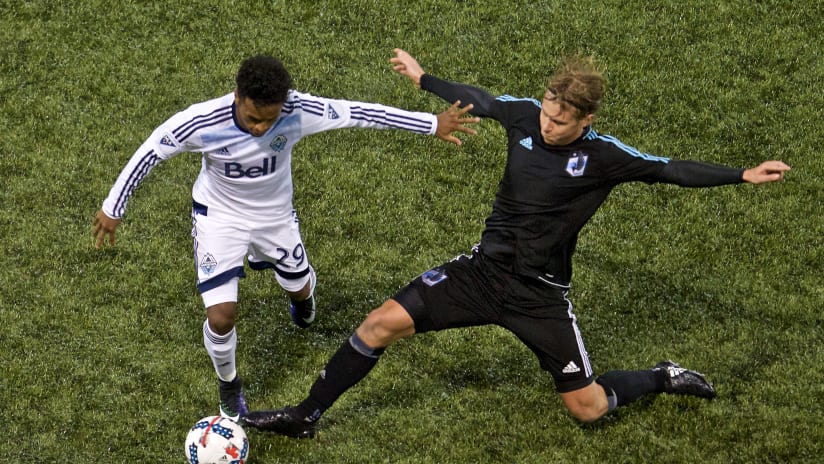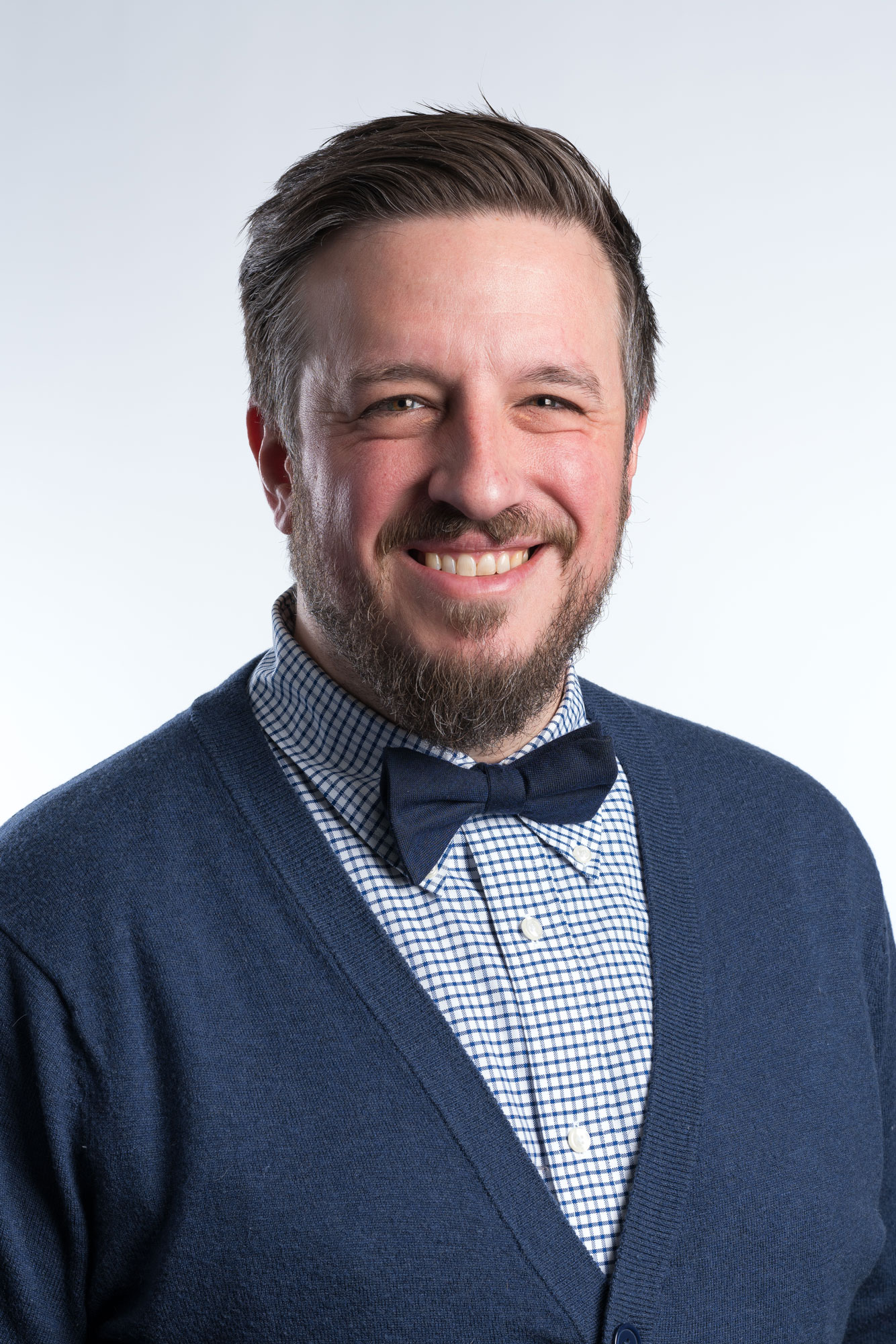How do you begin a new chapter without starting over? This is the question at the heart of many decisions Minnesota United FC has had to make this offseason as it prepares for its inaugural Major League Soccer season. They’ll be playing their home matches in a new venue, TCF Bank Stadium, but they’ll still practice at the National Sports Center in Blaine, where they played in the North American Soccer League. Their kits are new, but the colors are the same.
Nowhere is that bridge between past and present more apparent than in the way Sporting Director Manny Lagos, Director of Player Personnel Amos Magee and Head Coach Adrian Heath have worked together to build their roster.
“There was a very good existing NASL team here with good existing players,” says Magee. “These guys were outstanding players for that team and put Minnesota United on the radar. They earned our belief in them and we believe they can do it at the next level.”
Those players include fan favorites like Miguel Ibarra and Christian Ramirez, who formed a dynamic attacking duo nicknamed Batman and Superman, respectively. The players carried forward from the NASL days also include defenders Justin Davis, Kevin Venegas, Brent Kallman and Ismaila Jome plus midfielders Bernardo Añor and Ibson. That group of guys is helping newcomers get adjusted to the Twin Cities, but they’re also eager to prove they belong in MLS. The team is banking on that hunger becoming a catalyst.
It’s built into the philosophy Magee and co. talk about, one that ties together 40 years of soccer history in Minnesota with a thread of resilience. It’s not just about endurance, but about absorbing the hit and bouncing back. Since the founding of the Minnesota Kicks as part of the original North American Soccer League in 1976, pro soccer in Minnesota has been punctuated by periods of dormancy, but it’s never gone away entirely.
“We're taking a legacy of generations of pro soccer here in Minnesota,” says Lagos. “We're embracing the qualities that they built up and the history, the culture, the environment, the positives that they created. Creating the right culture and environment doesn't mean I just flip on a light switch. When we have dips, we work together, we pull each other up, and we keep going.”

This belief in building on an established work ethic and culture led to the decision to not focus on defining players with terms like “designated player.” Instead, they’ve worked to find players with the right kind of character. Designated players command salaries above and beyond the league’s individual maximum salary slot and are typically established names who can bring experience to an expansion side like MNUFC. But Magee — who brings six years of experience in MLS working with the Portland Timbers and D.C. United to Minnesota — doesn’t see a DP as a prerequisite for success in the league.
“In Portland in 2012, we got a designated player wrong based on his style and the style of what we were trying to do,” says Magee. “And then by 2013, we added Diego Valeri, who's turned out to be one of the best designated players in the league.” In D.C., the team had DPs, but many of them were earning salaries or would have commanded transfer fees that would today be bought down with targeted or general allocation money — a wrinkle that was added to MLS in 2015. More than anything, it points to the fact that in a changing and growing league, the terms aren’t set in stone or even tied to a distinct meaning.
“It's really too nebulous in terms of what it really implies, in terms of how you want to build a roster,” says Lagos. “With our roster building process we have a one-year plan, we have a three-year plan and we have a five-year plan.”
As both Lagos and Magee point out, several of the players they’ve brought in like Kevin Molino from Orlando City, Rasmus Schüller from BK Hacken in Sweden and Francisco Calvo from Deportivo Saprissa in Costa Rica would have counted as DPs a few years ago, like those players for D.C. United. It can be easy to get hung up on the terminology, but Minnesota United is focused on the players themselves.
“You really have to define value within your club and principles in terms of what you think is important,” says Lagos. “And for us and the club, what's really important in terms of the value is looking at a player and seeing what he can provide for the team and for the future, and not what he's done in the past.”
The team has focused on getting players on the edge of their prime in the hopes that they drive each other to excel. On the pitch, Heath is already seeing this approach paying dividends.
“The lads have been fantastic so far,” he says. “They’ve really bought into everything that we've wanted. One thing that's really apparent after only a short period of time is that they're a really honest group of guys that want to work hard and that's something that we tried to look at in the background of the players we were getting. We know we’re going to have testing times down the road, but I think that the chemistry is strong enough already that we'll be able to cope with that.”

In figuring out who they would go after to build their first roster, the team wanted to prioritize two things: first, that they were players who wanted to be here and two, that they were players with something to prove.
“Christian Ramirez is a perfect example,” says Heath. “The only question mark he's ever had is, ‘Can he do it in the MLS?’ He scored 16 goals in the NASL, can he be that guy? Can Kevin Venegas and Justin Davis step up? Everybody thinks they can, now it's up to them to prove it. Abu Danladi: It's alright being the superstar in college, can you transfer that into being a top professional? And you go through our team and it's nearly all the same: people with things to prove.”
That hunger and drive should prove a good match for the team itself. “I want to be very clear: we expect to be competitive and to push for the playoffs this first year,” says Magee. “We haven’t built this team for 2018.”
The future, then, is now for Minnesota United. There’s a lot riding on the way they’ve built on the past in order to compete in the present. The melding of all these things — the history of the club and soccer as a whole in Minnesota, the shape of their current roster, their evaluation of that roster to determine future needs — creates a process, and everyone has to buy in for it to be successful.
“The principles on which the club was built are going to be super important for the principles in the future,” says Lagos. “We are in a special market that is different than markets across the country. We have to remind ourselves: we’re in the north. We’re proud of that and it’s unique and we have to make sure that we keep that in mind as we try to build this team.”


